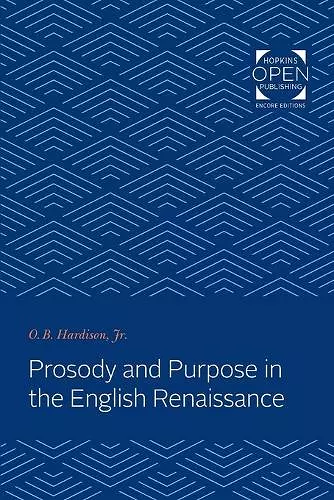Prosody and Purpose in the English Renaissance
Format:Paperback
Publisher:Johns Hopkins University Press
Published:23rd Jul '21
Currently unavailable, and unfortunately no date known when it will be back

Originally published in 1989. In Prosody and Purpose in the English Renaissance the eminent scholar O. B. Hardison Jr. sets out "to recover the special kinds of music inherent in English Renaissance poetry." The book begins with a thorough and wide-ranging survey of the development of prosodic theory from the ancient ars metrica tradition to the sixteenth century, with special emphasis on such issues as the relation of verse form and genre, the relation of syntax to prosody, and the role of language reform in shaping Renaissance prosody.
The second part of the book considers the impact of prosodic traditions on specific literary works and verse forms, among them Surrey's Aeneid, Heywood's translation of Seneca's Thyestes, Sackville and Norton's Gorboduc, and the dramatic and epic verse of Marlowe, Shakespeare, Spenser, and Milton. Throughout, Hardison examines not only how poets crafted their verse but why. He explores authorial purposes ranging from technical attempts to match sound and genre to the lofty aims of improving the vernacular or ennobling culture, from the dramatist's practical search for verse forms suited to the stage to Milton's quest for a meter fit to convey divine relation.
Two large points that emerge are the importance of 'construction' and, perhaps more surprisingly, 'the dominance of syllabic concepts of prosody.' Hardison concludes that the English verse of this period 'is best understood in terms of this tradition.' He has written a learned, interesting, and civilized book.
—Studies in English Literature
ISBN: 9781421430515
Dimensions: unknown
Weight: 476g
362 pages